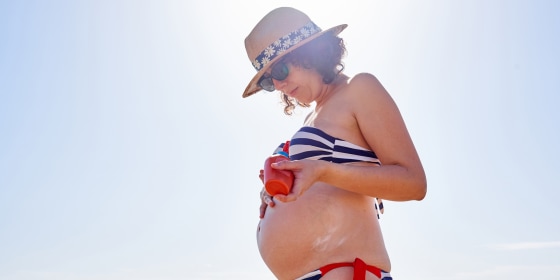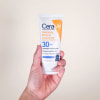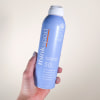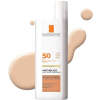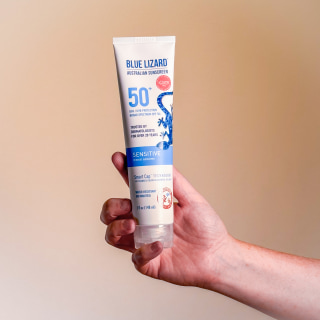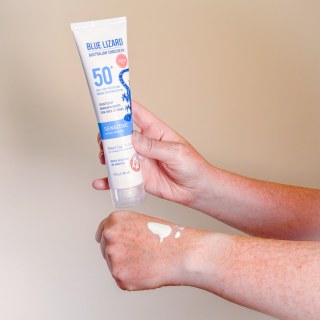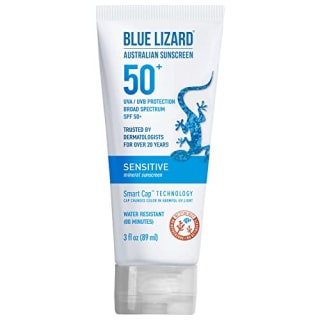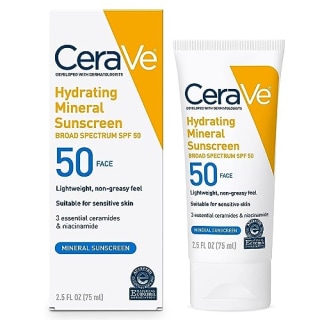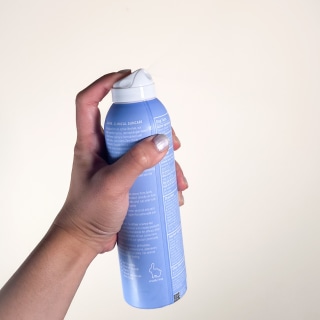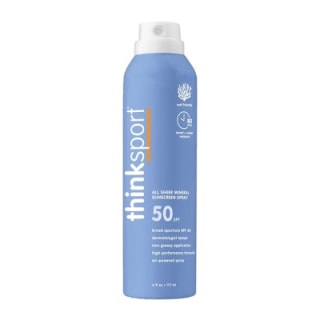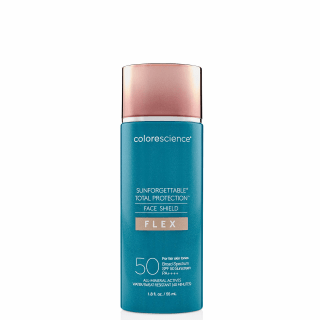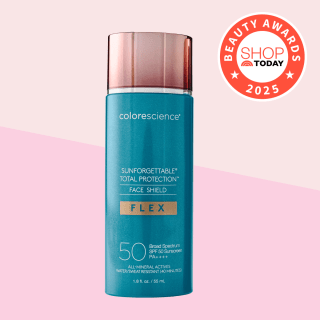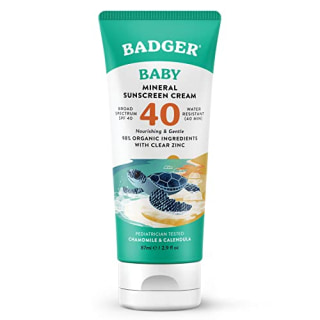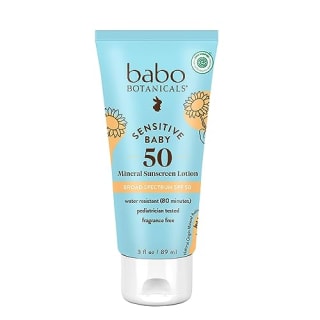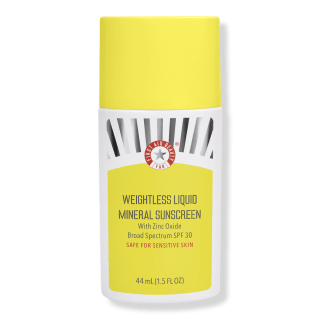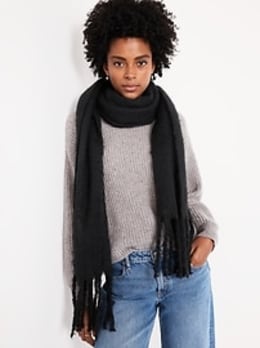No matter how old you are, sunscreen should be a vital part of your everyday routine — a skin care step all dermatologists will say is non-negotiable. Whether you have oily or sensitive skin, you might need a particular type of sunscreen and this is the case even if you're pregnant.
While our bodies naturally change as we age and progress through life, there’s no other time when the skin changes as rapidly as it does while pregnant or nursing. That’s right: While your body is undergoing massive internal changes, your skin simultaneously changes on the outside.
So how do you know which sunscreen to use while pregnant and nursing? Shop TODAY consulted the experts on how to navigate sensitive skin during this sensitive time. Keep scrolling to find the best sunscreens to shop from Blue Lizard, La Roche-Posay and more — starting at $11.
If you’re currently expecting, it’s a good idea to talk to your doctor about the sunscreen choice you make prior to applying.
Dermatologist-recommended pregnancy-safe sunscreen
Shop TODAY spoke with Dr. Marisa Garshick, a board-certified dermatologist, about different pregnancy-safe sunscreens she’d recommend. Garshick loves this Blue Lizard mineral sunscreen that contains zinc oxide and titanium dioxide.
Garshick also recommends this mineral sunscreen by CeraVe, noting that it’s also formulated with hydrating, skin-nourishing ingredients like hyaluronic acid, niacinamide and ceramides.
Because it is a mineral sunscreen, reviewers noted that it can leave a white cast which may not be suitable for all.
Garshick tells us that this sunscreen from ThinkSport is a “safe” option, too. The spray-on mineral formula has SPF-50 protection, and since it’s resistant to water for up to 80 minutes, it’s a great choice for summer trips to the beach or pool.
If you’re looking for a tinted sunscreen, this one from La Roche-Posay is a dermatologist-recommended option that Garshick notes with Shop TODAY. The mineral, antioxidant-rich formula is water-resistant for 40 minutes (so reapplication is a must if you’re in the pool or at the beach).
Not only is Garshick approving of this tinted sunscreen, senior SEO editor Jess Bender is a fan too saying that no matter which sunscreen she tries, she always reaches for this one. "Beyond offering plenty of pigmented coverage to save me some extra coverage swipes, I love how easily it absorbs into my skin without leaving the greasy feel I tend to get with other facial sunscreens."
Garshick says this sunscreen is “especially good for those dealing with melasma in pregnancy,” as its ingredients help protect against infrared radiation and blue light (as well as UVA and UVB).
Suitable sunscreens for pregnant and nursing women
This sunscreen boasts gentle and natural protection with simple and soothing ingredients like chamomile, calendula, sunflower oil and vitamin E. According to shoppers, this pick does a great job protecting the skin but it can be a little thick.
A pick from the EWG’s sunscreen guide for babies and children, this option offers broad-spectrum protection with SPF 50. Some verified reviewers note that this pick is good for sensitive skin that it doesn't feel greasy.
Zinc oxide is the key ingredient in this SPF 30 broad-spectrum sunscreen from fan-favorite beauty brand First Aid Beauty. Aside from protecting you from harmful rays, it also boasts the ability to combat skin care concerns like dark spots, fine lines and wrinkles.
How can pregnancy impact the skin?
Board-certified dermatologists Dr. Mona Sadeghpour and Dr. Noëlle Sherber tell us that during pregnancy, the skin can experience changes like hyperpigmentation, acne, topical sensitivities and rapid expansions in the skin, which often results in stretch marks.
Pregnancy- and nursing-safe sunscreen ingredients
Emily Spilman, a manager of the Environmental Working Group’s healthy living science team, alongside Sherber and Sadeghpour, calls out zinc oxide and titanium dioxide as the only two active ingredients recognized by the Food and Drug Administration that are classified as generally safe in sunscreen. These are two ingredients often found in mineral sunscreens.
“These products contain zinc oxide or titanium dioxide as active ingredients and are better for people, like pregnant women, with more sensitive skin,” she says. “Most products are fragrance-free and also made without allergens and other skin sensitizers.”
Ingredients to avoid while pregnant or nursing
Spilman, Sadeghpour and Sherber call out the following ingredients as ones to avoid in sunscreen for pregnant and nursing women:
- Oxybenzone
- Octinoxate
- Vitamin A and its derivatives (retinol, retinaldehyde, adapalene, tretinoin)
Spilman references a FDA study from 2019 that found that oxybenzone was one of the ingredients absorbed by the body after one use and can be detected on the skin and in the blood weeks after that use.
“Studies have shown that oxybenzone can contaminate the placenta and breast milk of marine mammals and humans,” she tells us.
In addition, a 2022 study conducted on mice in perinatal development found that oxybenzone, even delivered in low doses, negatively altered the mammary gland stroma.
Other consequences of exposure to oxybenzone Spilman mentions include being a potential endocrine disruptor and linked to shorter pregnancies, lower birth weights and an increased risk of endometriosis. While she tells us that fewer sunscreens are currently made with oxybenzone, “the EWG still found it in 30% of the non-mineral sunscreens reviewed.”
Spilman also calls out retinyl palmitate (another vitamin A derivative) and fragrance as harmful. She references a 2012 FDA study that suggested retinyl palmitate, when applied to the skin and exposed to sunlight, can potentially speed up the development of tumors and lesions. Fragrance (or parfum, as it may be called on some labels), can mean “an undisclosed mix of scent chemicals and ingredients used as fragrance dispersants,” and such mixtures have been linked to allergies, dermatitis, respiratory issues and reproductive system effects, she says.
Overall, she emphasizes the importance of reading sunscreen ingredient labels and avoiding the above ingredients in not just sunscreens, but any type of products, whenever possible.
Frequently asked questions
Overall, yes! Like foods, there are certain ingredients to look out for and avoid, but you should still be wearing sunscreen daily and taking sun protection measures while pregnant the same way you would when not.
Sherber, Sadeghpour and Spilman recommend choosing a sunscreen that is labeled broad-spectrum — meaning it offers UVA and UVB protection — with a SPF level of 30 or higher. “Since [the] pregnancy state does not change the photosensitivity of the skin, the recommended SPF is the same during pregnancy as [the] non-pregnancy state,” Sadeghpour tells us.
If, while pregnant or nursing, you’re experiencing more perspiration , Sherber says these conditions could “warrant more frequent reapplication.”
More tips for choosing a sunscreen while pregnant or nursing
Each expert leads with the fact that sunscreen is only one part of sun safety for pregnant or nursing people. They note that during this phase, people should also employ other forms of protection like wearing protective clothing, hats and sunglasses; avoiding extensive sun exposure during peak hours (10 a.m. to 4 p.m.); and staying in the shade. Sadeghpour says they are “not only excellent measures of sun protection, but they don’t require reapplication.”
While you might be tempted to grab the sunscreen with the highest SPF levels, Spilman suggests avoiding SPF levels above 50.
“[They] may not give increased UVA protection and can fool people into thinking they’re safe from sun damage.”
Her final tip is to avoid sunscreen sprays. She says they can make it difficult to apply the necessary amount of product and actually coating the skin can be difficult, in addition to aerosol inhalation concerns.
How we chose
To find the best pregnancy-safe sunscreens, we spoke with three board-certified dermatologists and a cosmetics/sunscreen expert about what sunscreen ingredients should be sought after (and avoided). We also included the specific recommendations of a board-certified dermatologist as well as an editor at Shop TODAY, along with shopper-favorite sunscreens that meet the criteria given by experts.
Meet the experts
- Dr. Marisa Garshick, MD, FAAD, is a board-certified dermatologist working in New York, New York and Englewood, New Jersey.
- Emily Spilman is the healthy living science program manager for the Environmental Working Group where she manages consumer databases, focusing on cosmetics and sunscreen.
- Dr. Mona Sadeghpour, MD, is a board-certified laser and cosmetic dermatologist. She is currently practicing at SkinMed Institute in Lone Tree, Colorado.
- Dr. Noëlle Sherber, MD, is a board-certified dermatologist and clinical associate professor at George Washington University in the dermatology department.


